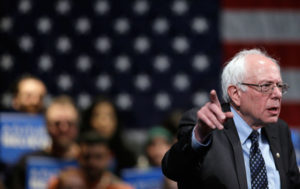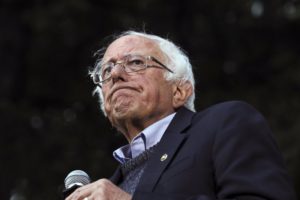Bernie Sanders Is Having a Moment
The exhaustive and exhausting analysis of the Fox News debate promises to produce days more of Trump-mania. It's thus an excellent time to ponder the other big surprise of the 2016 campaign: the Democrats' extended Weekend at Bernie's.
Juli Hansen / Shutterstock
The exhaustive and exhausting analysis of the Fox News debate promises to produce days more of Trump-mania. It’s thus an excellent time to ponder the other big surprise of the 2016 campaign: the Democrats’ extended Weekend at Bernie’s.
READ: Bernie and the Sandernistas: Into the Void
No one is more amazed about the buoyancy of his presidential candidacy than Bernie Sanders himself, which only adds to its charm. The Vermont independent and proud democratic socialist got into the race mainly to remind the country what a progressive agenda actually looks like. You can’t keep calling President Obama a socialist once you’re confronted with the real thing.
Then magic struck: Sanders started surging in the polls in Iowa and New Hampshire, two states that are demographically well set up for him and that also happen to hold next year’s first two contests. A poll this week from WMUR-TV in New Hampshire showed Sanders within six points of Hillary Clinton. The survey had a relatively small sample size and a rather large margin of error, but the trend it measured is consistent with other polls.
To paraphrase the late Robert Bork, the Sanders’ candidacy is a political analyst’s feast because it allows everyone to peddle his or her favorite preconceptions.
Conservatives point to his strength as proof positive of how left wing the Democrats have become. Clinton’s critics cite his rise as a product of her weaknesses. Progressives argue that Bernie taps into a deep frustration with inequality and the power of big money in politics while also reflecting the public’s interest in bold proposals to correct both. And those who go for big sociological theories link Sanders and Trump as avatars of a populist rebellion rooted in widespread impatience with the system and traditional politicians.
Let’s begin with a caveat: Bernie is for real, and his authentic authenticity is enchanting. But it’s not clear how big his candidacy will get. He is drawing large and boisterous crowds, but he is still not close to threatening Clinton in the national polls, partly because he hasn’t broken through among African-Americans and Latinos. They matter in the states that vote after Iowa and New Hampshire. This week’s NBC News/Wall Street Journal Poll showed Clinton with a 59 percent to 25 percent lead over Sanders nationally. Clinton’s share was down 16 points from June while Sanders was up 10 points. But a 34-point lead is still a 34-point lead.
Is Sanders’ ascent about Clinton’s problems? The evidence is mixed. In the WMUR Poll, 73 percent of New Hampshire Democrats had a favorable view of Clinton; Sanders’ favorability was at 69 percent. A fair share of Bernie’s people like Hillary, too.
But when asked about specific personal qualities, the poll’s respondents presented Clinton with a to-do list. Clinton was far ahead of Sanders as a strong leader, as having the best chance of winning in November, and as having the right experience to be president. But Sanders led as the most likable and most progressive. And when asked who was the “least honest,” 31 percent picked Clinton; only 3 percent picked Sanders. Washington punditry exaggerates Clinton’s problems, but her campaign should not underestimate them.
The ideological claims are more complicated. It’s true that Democrats — and not only Democrats — are far more aggressive in their opposition to economic inequality than they were, say, in the 1990s. But that’s because the problems of inequality, blocked mobility and wage stagnation are now more severe. And anybody who doubts that the superrich have gained even more power in the political system isn’t following the super PAC news. Sanders is marshalling these discontents.
On the other hand, Democrats haven’t changed nearly as much ideologically as conservatives claim. In 2008, according to numbers the Pew Research Center ran at my request, 34 percent of Democrats called themselves liberal, 37 percent called themselves moderate, and 24 percent called themselves conservative. In 2015, 41 percent were liberal, 35 percent were moderate, and 21 percent were conservative. Is there an uptick in Democratic liberalism? Yes. Has the party shifted sharply leftward? No.
As for alienation from the system, Trump and Sanders do speak to a disaffection that currently roils most of the world’s democracies. But their way of doing it is so radically different — Sanders resolutely programmatic, Trump all about feelings, affect and showmanship — that they cannot easily be subsumed as part of the same phenomenon. Sanders’ candidacy will leave behind policy markers and arguments about the future. Trump’s legacy will be almost entirely about himself, which is probably fine with him.
E.J. Dionne’s email address is [email protected]. Twitter: @EJDionne.
© 2015, Washington Post Writers Group
Your support matters…Independent journalism is under threat and overshadowed by heavily funded mainstream media.
You can help level the playing field. Become a member.
Your tax-deductible contribution keeps us digging beneath the headlines to give you thought-provoking, investigative reporting and analysis that unearths what's really happening- without compromise.
Give today to support our courageous, independent journalists.






You need to be a supporter to comment.
There are currently no responses to this article.
Be the first to respond.